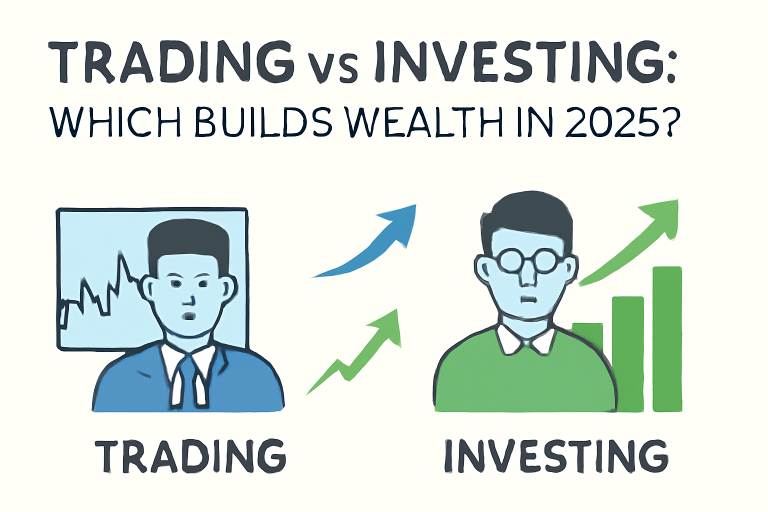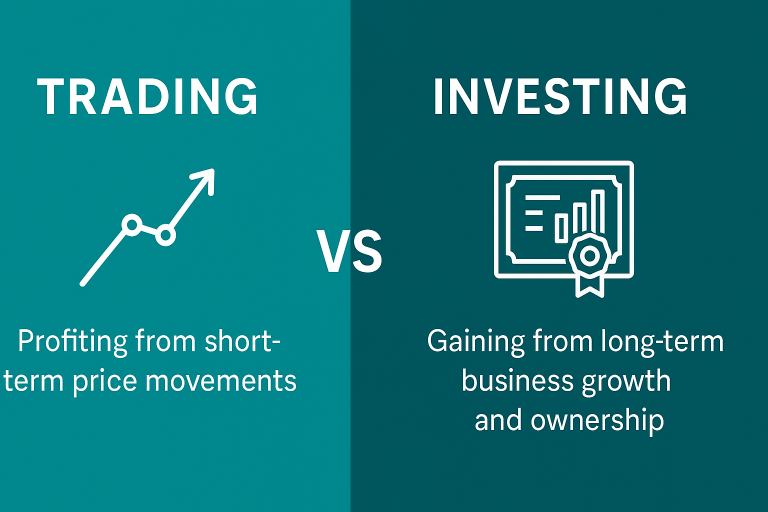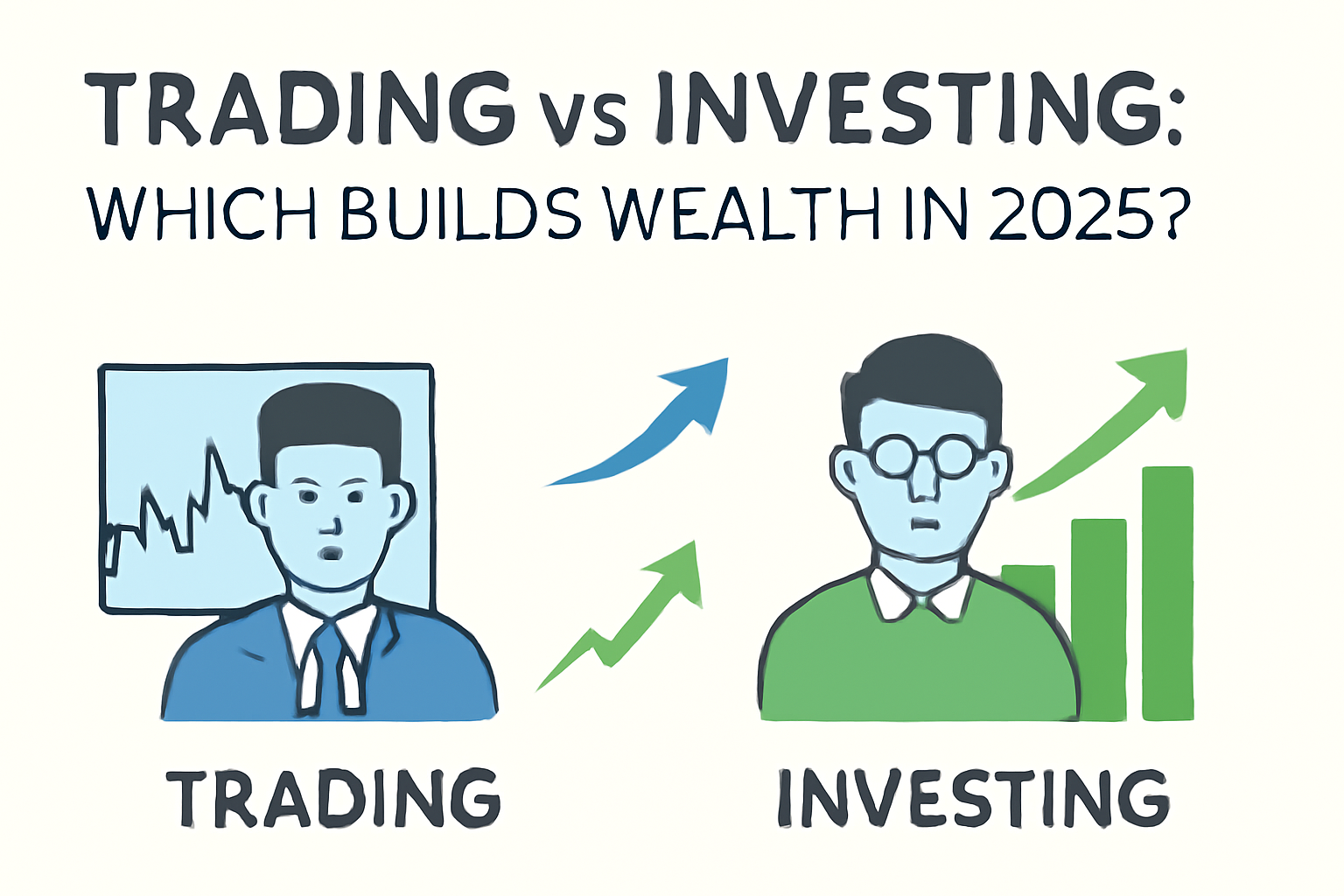Trading vs Investing: Which Approach Builds Wealth in 2025?

Introduction to Wealth Building in 2025
In a world where markets move faster than headlines, should you chase quick gains or build wealth slowly but surely?
In 2025, financial independence is more than just a buzzword—it’s a necessity. With rising inflation, AI-driven stock picking, and unpredictable global events, it’s essential to choose your financial strategy wisely. This article dives into trading vs investing—not just the definitions, but which truly builds lasting wealth in today’s evolving landscape.
What is Trading in Stock Market?
Trading refers to buying and selling financial instruments—like stocks, crypto, or derivatives—within short timeframes, seeking profits from price volatility.
Types of Trading
- Day Trading – Buy and sell within a single trading day.
- Swing Trading – Hold for days or weeks, capturing short-term trends.
- Scalping – Multiple rapid trades in minutes to pocket tiny profits.
Traders rely heavily on technical analysis, chart patterns, and indicators such as RSI, MACD, and moving averages.
What is Investing in Stock Market?
Investing means buying and holding assets (stocks, mutual funds, ETFs) over the long term to earn compound returns, dividends, and capital appreciation.
Popular Investment Strategies
- Buy and Hold – Build wealth over decades with fundamentally strong stocks.
- Value Investing – Seek undervalued assets based on earnings, assets, and market potential.
- Growth Investing – Target fast-growing companies, often in emerging sectors.
Investors analyze business fundamentals, management quality, and macroeconomic factors—not just charts.
Difference Between Trading and Investing
Aspect | Trading | Investing |
Time Horizon | Minutes to week | Years to decades |
Approach | Active and Technical | Passive and strategic |
Risk Profile | High due to Volatility | Lower if diversified and patient |
Tax Impact | Higher (short-term-gains) | Lower (long-term-gains) |
Profit Goal | Short-term income | Long-term wealth creation |
Difference Between Trader and Investor
Trader Mindset
- High risk tolerance
- Quick reactions to news
- Uses stop-loss and targets
Investor Mindset
- Focuses on long-term goals
- Tolerate short-term volatility
- Buys into businesses,not just prices
They both require discipline, but the psychology and strategy differ radically.
Trading vs Investing: Core Philosophies
Trading = Profiting from short-term price movement
Investing = Gaining from long-term business growth and ownership

Trading is like renting a house for quick gains; investing is like owning it and watching its value appreciate.
Compounding in Investing: The Magic Multiplier
Einstein once said, “Compound interest is the eighth wonder of the world.” Here’s why that still holds:
How It Works: Each year’s returns earn more returns. Over time, your money snowballs.
Case Study
|
Year |
Value (10% annual return) |
|
Year 0 |
₹1000 |
|
Year 10 |
₹2594 |
|
Year 20 |
₹6727 |
|
Year 30 |
₹17449 |

Long Term Investing vs Trading: Pros & Cons
|
Factor |
Long-term Investing |
Trading |
|
Stress Level |
Lower (set & forget) |
High (requires constant attention) |
|
Transaction costs |
Minimal |
Frequent, can add up |
|
Tax Efficiency |
Favorable |
Heavily taxed |
|
Success Rate |
High with discipline |
Low of most individuals |
|
Time Commitment |
Few hours/months |
Several hours/day |
How to Invest in Stock Market (2025 Guide)
- Set Clear Goals – Retirement? House? Education?
- Pick a Broker – Look for low fees and a good mobile app
- Start with Index Funds or ETFs
- Use SIP or Dollar-Cost Averaging
- Review & Rebalance Annually
- Understand Taxation – Know LTCG, STCG, and dividend taxes
Portfolio Management for Beginners
Smart portfolio management includes:
- Diversification – Spread risk across sectors (IT, Pharma, FMCG, etc.)
- Risk Profiling – Match investment type to your life stage
- Rebalancing – Adjust allocations annually based on performance
Tip: Consider robo-advisors like INDmoney or Kuvera for simplicity.
Benefits of Investing Over Trading
 Mental Peace – No need to track daily market movements
Mental Peace – No need to track daily market movements Lower Costs – Less brokerage, lower taxes
Lower Costs – Less brokerage, lower taxes Tax-Efficient – Capital gains taxed at lower rates over long term
Tax-Efficient – Capital gains taxed at lower rates over long term Compounding – Passive exponential growth
Compounding – Passive exponential growth Time Freedom – Focus on career or business while your money works
Time Freedom – Focus on career or business while your money worksTrading or Investing: Which is Better for You?
Ask yourself:
|
Question |
Ideal Approach |
|
Do I have time for charts and market news? |
Trading |
|
Do I prefer stress-free wealth building? |
Investing |
|
Can I handle high risk and losses? |
Trading |
|
Do I want consistency and stability |
Investing |
For most people, investing wins by a wide margin—but a small trading allocation can offer learning and excitement.
Investing for Beginners: Getting Started Safely
 Avoid penny stocks and “hot tips”
Avoid penny stocks and “hot tips”
 Accept that markets fluctuate
Accept that markets fluctuate
 Invest in knowledge before money
Invest in knowledge before money
 Use demo accounts or ₹1,000 SIPs to begin
Use demo accounts or ₹1,000 SIPs to begin
The first step isn’t investing—it’s educating yourself.
Combining Trading and Investing: A Hybrid Approach
Some people successfully blend both:
70% long-term investments in equity, ETFs, and debt
30% active trading capital for intraday or swing opportunities

Mistakes to Avoid in Trading and Investing





Success = Strategy + Psychology + Discipline.
FAQs
1. Is trading more profitable than investing?
Short-term? Sometimes. But in the long run, investing wins with less stress and more reliability.
2. What’s the safest way to start?
Start small with index funds or blue-chip stocks, and use SIPs.
3. What are the tax benefits of long-term investing?
In India, long-term capital gains up to ₹1 lakh are tax-free.
4. Can I do both trading and investing?
Yes, with discipline. Keep them separate and avoid using investing money for trades.
5. Is it too late to start investing in 2025?
Not at all. The best time was yesterday. The second-best time is now.
6. Why do most traders lose money?
Lack of strategy, poor risk management, overconfidence, and chasing FOMO.
Conclusion: The Path to Building Wealth in 2025
While trading offers thrills, investing offers stability, compounding, and long-term wealth. The data, the success rates, and the peace of mind all point to one conclusion:
If you want to sleep well at night and wake up richer in 10 years—invest, don’t just trade.







